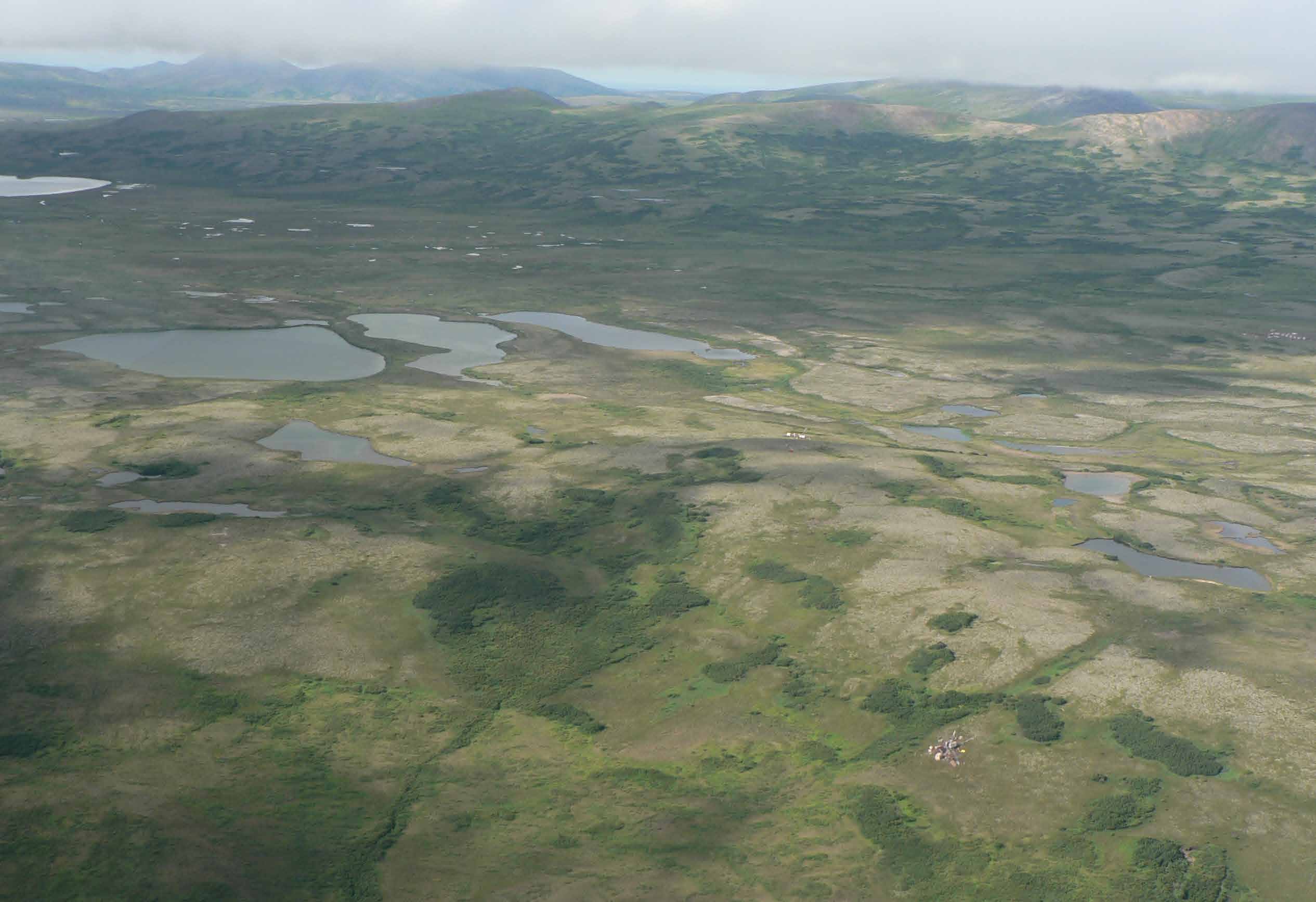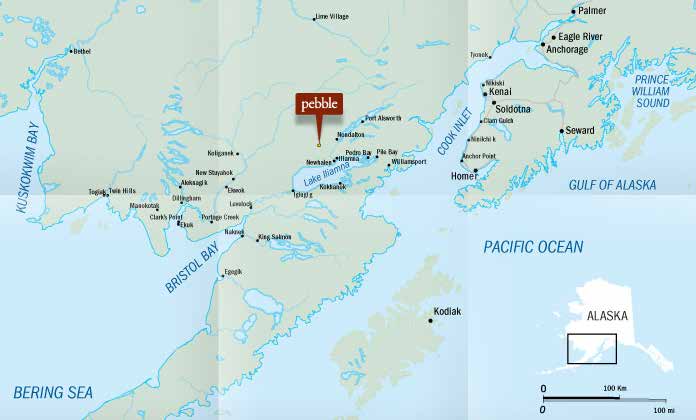State calls on EPA to halt Pebble review
pending completion of permitting process
By Marleanna Hall
Shortly after February’s release of its final Bristol Bay Assessment (BBA), the Environmental Protection Agency (EPA) announced it would initiate a determination process on whether or not Section 404(c) of the Clean Water Act should be used to preemptively veto the Pebble project.
Following this announcement was a 15-day comment period for the State of Alaska, as the land owner, and the Pebble Limited Partnership (Pebble), as the project proponent, and the U.S. Army Corps of Engineers (COE), as lead permitting agency, to demonstrate how the project will protect the sockeye salmon fishery in Bristol Bay.
In early March, Alaska’s Attorney General Michael Geraghty wrote the EPA, noting the agency’s actions were premature, and urging it to allow the state a reasonable time to respond. The EPA has allowed an extension to the end of April for the state, Pebble, and COE to provide a response.
Geraghty has asked the EPA to halt its review actions “until permit applications for an actual mine project are submitted and thorough reviews by state and federal regulatory agencies are completed.”
Governor Sean Parnell explained, “When a company applies for a state permit it kicks off a process. We’re not even at that stage yet. However, the EPA is stepping in and saying we want to influence this before a public permitting process can begin.”
During the Section 404(c) process, the EPA said it can decide that further review is not necessary, determine and set restrictions for the project, or halt the review and preemptively veto the entire project. Also during the review process, the COE cannot issue a Section 404(c) permit for fill in wetlands or streams associated with mining the Pebble deposit. No mine permit has been applied for, so the COE would nonetheless not issue such a permit at this time.
However, one of RDC’s concerns is the tone of the EPA announcement, which suggests the agency has already predetermined it will not allow Pebble to proceed, regardless of mine design, mitigation measures, and reclamation plans. Project proponents have yet to put forward a formal mine plan or file for a single project permit under the multiyear National Environmental Policy Act (NEPA) permitting process.

In the lower right portion of this photo of the Pebble prospect, a small exploration drilling site is visible. The copper and gold prospect is located 200 miles southwest of Anchorage on state land set aside for its mineral potential.
EPA Administrator Gina McCarthy referred to “extensive” scientific studies leading the EPA to its conclusion of the “Pebble Mine.”
RDC continues to question the science used for the BBA, and purports the EPA did not use the best available science in development of the assessment, and that the engineering modeling in the BBA is seriously flawed and not based on realistic, modern standards, among other concerns.
Further, RDC is concerned the unprecedented nature of a preemptive veto could discourage investment and delay or even halt future projects altogether. Rural Alaska, where oftentimes economic opportunities are few or do not exist, should not be subject to this or any type of government overreach, RDC argued.
The premature initiation of the Section 404(c) process has caused sharp reactions by Alaska’s congressional delegation.
U.S. Senator Lisa Murkowski discouraged use of the Section 404(c) process prior to mine permit application.
“I remain convinced that a preemptive veto of a mine or any other project, which the agency claims it can do under the Clean Water Act, would set a terrible precedent for development in our state and across the nation,” said Murkowski. A preemptive veto of the Pebble project, before a permit has been applied for, is “outside the legal authority that Congress intended to provide EPA,” Murkowski added.
U.S. Congressman Don Young expressed disapproval of the EPA’s actions, calling the actions unwarranted.
“This expansive, jurisdictional power grab proposed by the EPA severely jeopardizes not only Alaska’s sovereignty, but the rights of states and all private property owners nationwide,” said Young.
U.S. Senator Mark Begich issued an immediate release in response to the initiation of the Section 404(c) process, noting, “I am skeptical of federal overreach from an administration that has already demonstrated it does not understand Alaska’s unique needs,” adding that he will “be making sure the administration does not take any actions that could have unintended consequences down the road for this region or other development projects in Alaska.”
However, Begich did not go as far as opposing a Section 404(c) veto, and has said that “any use of the 404(c) process must be as narrow as possible.”
In a recent Anchorage Daily News editorial, a former President of Alyeska Pipeline Service Company, David Wight, explained, “No matter where you stand as Alaskans on Pebble – opposed, support or undecided – the EPA’s decision to use the Clean Water Act to most likely prohibit the mine is a troubling, unnecessary intervention that skips its own fair, thorough process already in place.”
He went on to explain, “Alaska has successfully developed natural resources for many tens of years in partnership with the EPA using the NEPA process... I am not aware of any major Alaska resource development that did not use NEPA until the EPA announced they would sidestep NEPA and use the Clean Water Act 404(c) process for Pebble.”
In an opinion piece to the Bristol Bay Times, Lorene Anelon, President of Iliamna Natives Limited and Iliamna Development Corporation, said, “The people who are impacted the most are the local Village Corporations, hardworking Alaska families and businesses that would benefit from this project. This is a vital project to this community as well as the State of Alaska for future prosperity.”
In addition to efforts to halt the unwarranted Section 404(c) process, RDC has requested support from Alaska’s congressional delegation for legislation to rein in EPA authority (see page 3), as well as an investigation by the EPA Inspector General (IG) of the EPA’s actions surrounding the initiation of the BBA, and the process used to develop it. RDC has called on Murkowski, Begich, and Young to support a full investigation and a formal response by the IG prior to proceeding in the Section 404(c) process.
In a January request, Northern Dynasty Minerals Ltd. (NDM), the owner of the Pebble Limited Partnership, asked the IG to investigate the agency’s watershed assessment, as well as other aspects pertaining to the process and the EPA’s actions. The State of Alaska has made a similar request of the IG.
In its letter, RDC wrote, “NDM raises some serious issues regarding the credibility of the watershed assessment, and whether it is in fact a science-based document, or merely a means for the agency to rationalize its preconceived conclusions. Because the assessment may underpin the EPA’s conclusions with respect to an anticipated preemptive 404(c) determination, it is imperative that the irregularities raised by NDM be impartially investigated so the public and congress can gauge the document’s credibility.”

Return to newsletter headlines